- Home
- Various Authors
Warcry: The Anthology Page 3
Warcry: The Anthology Read online
Page 3
Some time later, a shard of silver appeared in the grey. It was impossible to tell how far away it was, but it was like the beacon of a lighthouse in the nothingness. Gravskein strode towards it. Gradually, the splinter widened. Reaching it seemed to take days. It grew more distinct, yet never closer, receding as if it were a mirage. And then, suddenly, they were upon it.
The Companions stood on the banks of a river. There was no light for the water to reflect, yet it gleamed like a knife. It flowed to Gravskein’s left. Its current left its surface smooth. There was movement, but it was unhurried. Gravskein had the sense of immense strength in this water, if it was truly that.
Skarask and Rezhia knelt at the river’s edge.
‘Wait,’ Gravskein told them.
They obeyed.
‘This river gives no life to the land,’ she said. Its banks were as barren as the rest of the plain. ‘It is the bringer of death.’ She spoke with satisfaction. At last, she had found what she sought. She had found the poison.
‘Then you have brought us to our doom,’ said Bulsurrus.
‘No. Victory is in our grasp. I have known this river in my visions. It points the way forward, because it flows from the Tower of Revels. Now there is direction in our search.’
She raised her voice as she spoke, addressing the warband as a whole. She reached out with her left scythe. ‘If we drink from this river, we will die. If we follow it to its source, we will triumph.’
She looked at the torn faces before her. They were incapable of any expression except a snarl, but she saw the renewal of hope and determination in the eyes of her followers. Bulsurrus looked back at her sullenly, but she thought that she saw embers of hope stirring in him too. He had never reconciled himself to his humiliation at the hands of the blood knight, or to her sudden ascendancy. But she knew he was as committed to the quest as she was. He felt the call of the tower and all it represented as powerfully as any of them.
They followed the river upstream. There was no sense of going uphill, and nothing else in the limbo changed. The presence of the river was enough to renew Gravskein’s strength. It curved lazily over the plain, a complacent, silver serpent, filled with the power of death. After a short while, Gravskein barely saw it as a thing of water. The gleam was too bright. It was the very essence of poison. She was not tempted to drink it, yet she began to wonder if perhaps she should. Not to quench her thirst, but for other, deeper reasons. She was able to resist the call without much of a struggle, but it stayed with her. She kept finding herself staring at the river, summoned by a promise of meaning.
She focused on the promise she knew was certain. The river was the road to the tower.
At last, the river took the warband out of the plain. Hope flared and guttered at almost the same moment. The grey vanished. The reddened skies of the Bloodwind Spoil returned. There were clouds again, boiling down from the sky, dark as bruises, thick as tumours, swollen with the promise of Ruin within. The horizon was visible once more, and features had returned to the landscape. The land sloped upward steeply. Behind them, the way back into the limbo disappeared.
And the path indicated by river vanished too. The river flowed by out from the bottom of the hillside, and there was no longer any sign of it above ground.
‘The river’s path could lead anywhere,’ said Bulsurrus.
‘Where would you lead us, then?’ Gravskein demanded. ‘Has the path to the tower revealed itself to you?’
Bulsurrus did not answer.
‘We go forward, the way we have seen,’ said Gravskein. ‘Forward, and up.’
The hill before them was covered in tall grasses. The stalks were a deep black, shiny as oil, and streaked with crimson red. A wind had sprung up when the warband left the grey plain. The grass waved back and forth, the movement like a strange, mindless, serpentine nodding.
Gravskein climbed the slope, her bladed legs slicing and crushing stalks. Ichor spurted from the torn grass, soaking the ground. It slid, hissing, down the lengths of her blades. As she looked, frowning, at the steam rising from the black fluid, the cries of battle erupted behind her.
Gravskein spun around. The grass was waist-high on her comrades, and it was attacking them. Long, silken tendrils shot out from the lengths of the stalks and fastened themselves to flesh. The tips of the grass bowed, blades peeling back to reveal stingers sharp and hooked as a scorpion’s. They stabbed deep into legs and arms and torsos, and where they stabbed, they burrowed in. Stalks grew thicker as they fed on the blood of the Unmade.
The warriors slashed at the grass, their blades chopping down stalks by the score, then by the hundred. But the carnivorous vegetation grew thick and strong. The Companions of the Harrower tried to clear a path and move forward, but the stalks reached for them without pause. Bulsurrus swept his arms, cutting himself free, but more grass sprang up and grabbed the underside of his arms, slowing him down, tangling him in a web of grasping hunger. Rezhia chopped away at the stalks wrapped around her thighs, and she coughed up dirty blood.
‘Venom,’ the Ascended One gasped.
Even as the crisis mounted, Gravskein rejoiced. The land was still poisoned. Everything that lived in the Bloodwind Spoil was corrupted, but the corruption of the grass was still of the kind she sought. The river could hide itself, but it could not hide the fact of its presence. Not yet, at least.
She rejoiced, and she began the dance that was the special gift of the Blissful Ones. It was an old dance, a savage memory of a much older one. It had once been performed in the courts of Tzlid in the forgotten ages, before the great transcendence. Once, the dance had been without blades, and without the blood of partners. It had become something much more pure, much more glorious. Pain consumed Gravskein, and she brought pain to the world. She brought pain to all the world, to every direction, and she whirled, a slashing, leaping, dancing frenzy of blades. The grass could not touch her. The flesh of her stumps was too high for it to reach. It died beneath the vortex of her dance, scythed down by her passage. As she turned and spun, the pull of the blades on her arms and the jerk of the metal into her knees ignited more agonies, and her dance grew wilder. She danced back downhill to her fellows, and then uphill once more, cutting a wide swath through the grass.
Bulsurrus and the rest of the Companions fought free of the stalks that held them and moved up the trail Gravskein had created. On either side, grass whipped wildly, the movements a wail of frustration. Gravskein danced, barely conscious of where she went, except that she was going up, climbing, ascending as she always had towards greater pain and greater bloodshed, and to the promise of the Tower of Revels, always following the example set by the vanished, beloved king.
The grass became sparser as she went higher. She stopped dancing when she reached the crest of the hill, because there was nothing left to kill. The grass was present only in sparse, ragged clumps now, easy to avoid.
The land before the Unmade was more level. Now the corruption of the poison appeared in the form of huge, burst pustules of stone. They clustered across the rolling vistas. There was more death here. As if the river had become a treacherous vein beneath the flesh of the land, the ground had died covered in boils, the punctured hemispheres of rock the expression of the fever killing from within.
The boils stretched as far as Gravskein could see.
‘We are no closer,’ said Bulsurrus.
‘We are,’ Gravskein insisted.
‘What are those?’ said Skarask.
Gravskein squinted in the direction he pointed. There were some irregular shapes on an area of level ground. They did not look natural.
She ran towards them.
The shapes were ruins. The Companions of the Harrower had seen many as they travelled the Bloodwind Spoil. These, though, were recent. There was a habitation here, a small village of crude stone dwellings. As the warband reached the village, it became clear that
the bricks of the houses were much older than the constructions themselves. Many were fragments of larger slabs, the engravings that had marked them changed into mysterious, unreadable lines.
Gravskein walked between the houses, wary of ambush, and saw that the community had been built on the foundations of another. Cracked roads ran through the village and beyond, disappearing in the pustules of rock. Gaping crevasses showed huge, buried façades. To her left, the hand of a monumental sculpture reached up from the ground. It was a clenched fist twenty feet across, and it clutched the hilt of a broken sword.
‘There was a great city here once,’ Gravskein said.
‘Once,’ said Bulsurrus. ‘It must have been destroyed long ago.’
‘But it has provided the means for something else to come into being.’ Gravskein gestured at the village.
She thought of Tzlid, and of brutality raised over the ruins of lost grandeur.
The new village was silent. It was as dead as the city it had scavenged. The huts were a small cluster at the edge of the ruins, and it took very little time to search them. The first structure Gravskein looked inside was empty.
‘Here!’ Skarask called. ‘Our lost comrades are here!’
Gravskein ran to join him. She strode past the other Unmade and ducked through the misshapen doorway.
There were four bodies here. Familiar ones. A group of the Unmade had breathed their last in this hut. Gnawed bones were scattered over the floor and piled in a heap in one corner. The corpses were so emaciated, their blades seemed thicker than the limbs. In the end, they had been too weak even to consume those who had died first. They were rotting, but slowly, the flesh like desiccated leather. They were almost unrecognisable, but Gravskein knew who they were.
So did Bulsurrus, coming in after her. ‘Vaking, Arvex, Carrika and Tervour,’ he said.
‘Those who went before us,’ said Skarask.
Gravskein nodded. They were members of the band who had been the last to depart on the search before her own. ‘They did well,’ she said. ‘They came this far. Their names will be honoured.’
‘This far?’ Bulsurrus asked. ‘This far to what? They died here, and we have retraced their steps. Where is the victory? We do not know we have done anything except repeat their path to doom.’
‘They fell here, but we are standing. We will go on. We will find what they did not.’ Gravskein turned to the other Companions gathered at the doorway. ‘Take their strength,’ she said.
When she and her band had fed again, they moved deeper into the ruins, searching for more bodies. They had not seen the leader of the dead yet, and Gravskein wondered where he had gone. Perhaps Kalphor had died before the others, but she thought that unlikely. He had been powerful. He would not have been easily defeated by death.
Little of the city was still above ground. Even so, its structures had been so huge that, though they were shattered, fallen and buried, the fragments that broke the surface were still massive, and the Companions of the Harrower had to weave between them. A pile of smashed brickwork was as tall as a hill. A cornice jutted up from the stony ground like the prow of a huge ship. The peak of a column, over fifty feet wide, leaned heavily forward. It was carved into the shape of a horned beast. The wind whistled through the jaws, a deafening shriek, and they ground slowly open and closed.
From the other side of pillar came a steady, thunderous roar. The Unmade rounded the column, and entered a buckled plaza. At its centre was a tremendous fountain. The poisoned river launched itself into the air with such force that the geyser rose to more than a hundred feet. Boulders danced in the air, perpetually suspended by the fountain. A wide pool surrounded the geyser, its edges cracked and leaking the silver poison. The water worked its way through the cracks in the paving stones back down into the earth.
The corpse of a Blissful One lay next to the pool. Gravskein left her followers at the edge of the plaza and stalked over the gleaming puddles of venom to stand next to the body of her predecessor. It was not just Kalphor that she had hoped to find. It was what he had carried with him from Tzlid. Kalphor had been a transcendent warrior, and there had been great hopes that he, at last, would find the Tower of Revels. As a mark of that hope, he had been given a precious relic to carry with him. It should have been mine, Gravskein thought. Mine were the strongest visions. The proof of her worthiness was before her. She was alive. Kalphor was dead.
A slug-horn hung from an iron chain around Kalphor’s neck. It was to be blown when the Tower of Revels was found and claimed at last. With a dextrous flick of an arm-blade, Gravskein lifted the chain from Kalphor and draped it over her own neck.
She was about to walk away from the corpse when the geyser of poison called to her. Its pull was much stronger than when she had been looking at the river. A turning point was upon her. She could not say how she knew this. She only knew that it was true.
She gazed up at the roaring heights of the fountain, at the silver venom shining in the red light of the Bloodwind Spoil, at the boulders that danced on the crown of its ferocity. She thought of the poison of the dire wolf, and how the suffering it had caused her had taught her the way forward.
Look for the poison.
Gravskein knew what she had to do. If she was truly worthy of this quest, then there was no reason to hesitate. She bent over the wall of the fountain and drank from the pool.
Her mouth burned. Her throat burned. Acid fire raced through her frame. Flames of iron consumed her. Blades of glass slashed at her core. Her vision splintered and filled with red. She screamed in joy at the sun of pain that engulfed her. She spread her arms to embrace it. She was Unmade, she was Blissful, all pain was a gift. It could bring death to her. It brought transcendence, it brought completion, and it brought enlightenment.
A new vision came.
The tower was close. She could feel its shadow weigh upon her though she could not see it. The tower’s call was a roar that drowned out the fury of the geyser. She turned her head in the direction of the call. She was blind to the land before her. Her eyes saw nothing but the red of boiling blood, and a jagged slash of lightning gold pointing the way. The lightning flashed and stabbed into her heart. She gasped, her lungs shredding with agony and hope. The immensity of the Flayed King’s legacy was upon her, demanding her presence. If she was weak, as Kalphor had been, the vision alone would tear her apart.
She withstood its glory, just as she withstood the joyous pain of the poison. Then both faded, and she could see the plaza again, and her warband at its edge. She returned to her followers, and their eyes shone with open wonder. Even Bulsurrus was silent, stunned by what she had done.
‘The way we must go has been revealed to me,’ she said. She raised one of her beautiful hooks and pointed to the hillside to the left of the fountain. There was a path that climbed steeply between thick clusters of overlapping pustules.
‘Will we see the tower from up there?’ Rezhia asked.
‘I do not think so.’ The tower had still been hidden from Gravskein in the vision. The journey was not over yet. ‘But the signs of its presence will soon be visible to all.’ She was confident in her pronouncement. She was shedding the scales of doubt and despair like an old skin, like the face of weakness that hung, tattered, on her armour.
And indeed, they found a sign waiting for them just past the crest of the stony rise. There was a body and another Unmade mounted like a scarecrow on two crossed iron posts.
‘Jaggak,’ Bulsurrus said, grieving. This had been the Joyous One of Kalphor’s band.
One sword was lashed to Jaggak’s side. The other pointed down the slope towards a wide, shallow bowl, surrounded on every other side by jagged cliffs. Above Jaggak’s head was a medallion engraved with two entwined serpents.
‘Our comrade points the way,’ said Gravskein.
‘To an ambush,’ Bulsurrus said.
‘Certain
ly.’ The slopes around the bowl were heaped with jumbled boulders, perfect for concealment.
‘Yet you intend to follow.’
Gravskein turned around slowly, taking in the landscape with a hook. To the left and right of the direction indicated by the corpse, the paths from the hill descended into a maze of gorges. ‘Will you have us wander fruitlessly?’ Gravskein asked. ‘Is that what you would prefer?’
‘The trap is not concealed,’ Skarask said, looking into the bowl.
‘It is not,’ Gravskein agreed. ‘It is a challenge, not a trap.’
The floor of the bowl was littered with the bones and armour of countless warriors. Decaying shields and blades glinted in the blood-red light. Many battles had been fought here, to no clear end. There was nothing to defend. To look at it, the bowl was merely a place to kill and die.
‘What is to be gained in accepting an invitation on the terms of the enemy?’ Bulsurrus asked. ‘This is foolish. This is madness.’
‘Those who would stop us here must have a reason,’ said Gravskein. ‘They wish to prevent anyone from going any further. We will thwart their desire. We will defeat them, we will go on, and we will see what they do not wish us to see.’
‘Think about what you are saying! You would never court so obvious an ambush in Tzlid. Or if you did, your comrades would cut you down.’ He spoke out loudly, for all the Companions of the Harrower to hear. He turned to the others, extending a silent invitation for them to rally behind him.
They did not move. They remained silent, waiting to see the end of the confrontation.
‘This is not Tzlid,’ Gravskein said. ‘This is no ordinary battle. The Gods have led us here to prove ourselves worthy.’ She spoke with all the conviction of her faith. ‘Don’t you see? Can’t you understand? After everything we have struggled through, we cannot say that it is chance that has brought us to this moment. That is foolishness. That is madness. The Gods call us. We must answer.
‘Come,’ she said, before Bulsurrus could respond. She strode down the slope, daring Bulsurrus to strike her in the back. She did not look back. Do it now. Kill me or follow me.

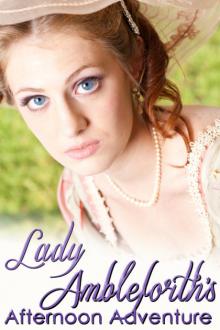 Lady Ambleforth's Afternoon Adventure by Ann Lethbridge, Barbara Monajem, Annie Burrows, Elaine Golden, Julia Justiss and Louise Allen
Lady Ambleforth's Afternoon Adventure by Ann Lethbridge, Barbara Monajem, Annie Burrows, Elaine Golden, Julia Justiss and Louise Allen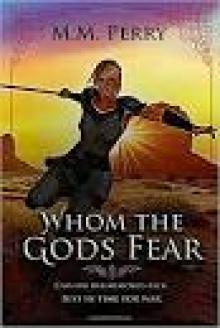 Gods & Mortals
Gods & Mortals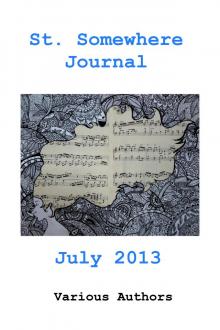 St. Somewhere Journal, July 2013
St. Somewhere Journal, July 2013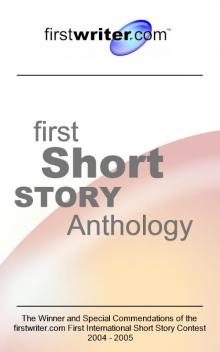 firstwriter.com First Short Story Anthology
firstwriter.com First Short Story Anthology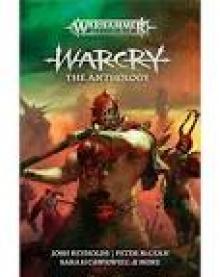 Warcry: The Anthology
Warcry: The Anthology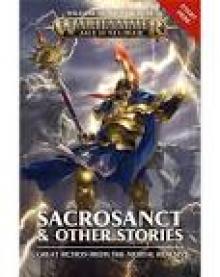 Sacrosanct & Other Stories
Sacrosanct & Other Stories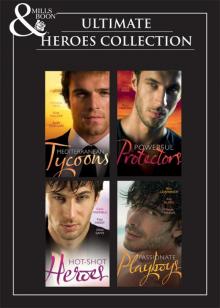 Ultimate Heroes Collection
Ultimate Heroes Collection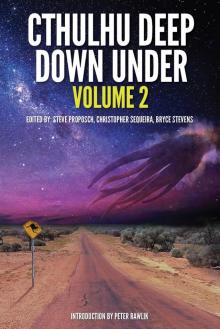 Cthulhu Deep Down Under Volume 2
Cthulhu Deep Down Under Volume 2 Erotic Classics II
Erotic Classics II Dynasties: The Elliotts, Books 1-6
Dynasties: The Elliotts, Books 1-6 Dynasties:The Elliots, Books 7-12
Dynasties:The Elliots, Books 7-12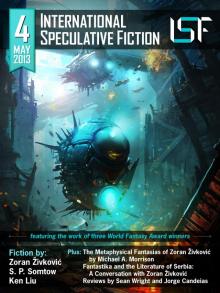 International Speculative Fiction #4
International Speculative Fiction #4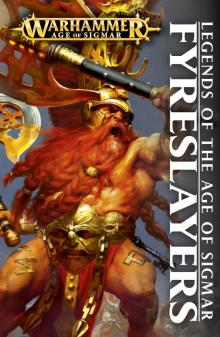 Fyreslayers
Fyreslayers One Night In Collection
One Night In Collection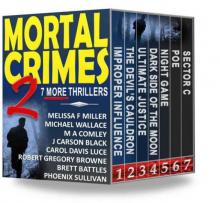 Mortal Crimes 2
Mortal Crimes 2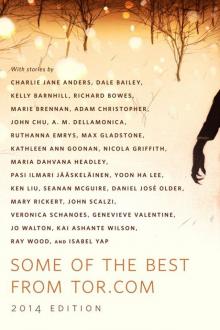 Some of the Best from Tor.com
Some of the Best from Tor.com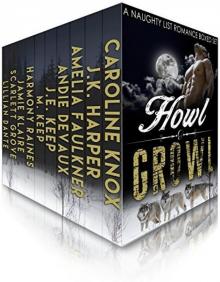 Howl & Growl: A Paranormal Romance Boxed Set
Howl & Growl: A Paranormal Romance Boxed Set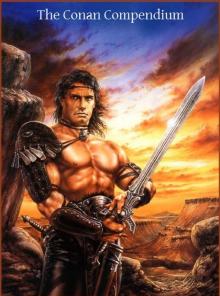 The Conan Compendium
The Conan Compendium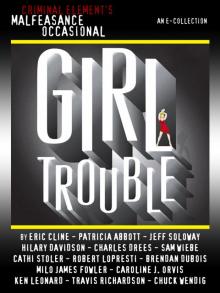 The Malfeasance Occasional
The Malfeasance Occasional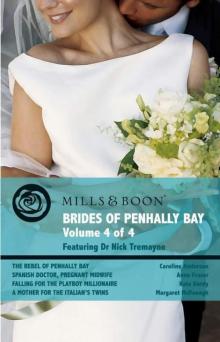 Brides of Penhally Bay - Vol 4
Brides of Penhally Bay - Vol 4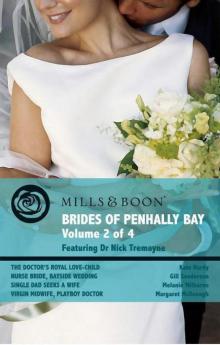 Brides of Penhally Bay - Vol 2
Brides of Penhally Bay - Vol 2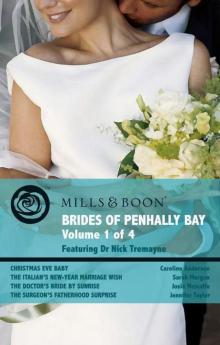 Brides of Penhally Bay - Vol 1
Brides of Penhally Bay - Vol 1 School's in Session
School's in Session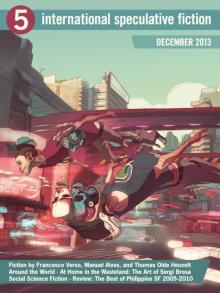 International Speculative Fiction #5
International Speculative Fiction #5 Erotic Classics I
Erotic Classics I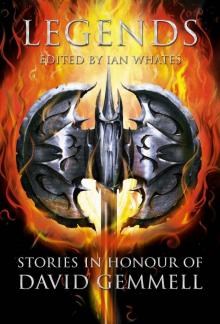 Legends: Stories in Honor of David Gemmell
Legends: Stories in Honor of David Gemmell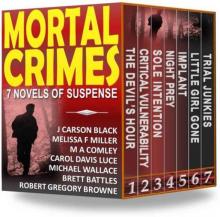 Mortal Crimes 1
Mortal Crimes 1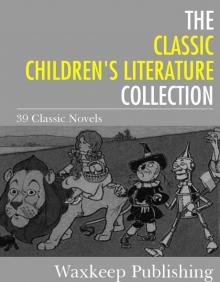 The Classic Children's Literature Collection: 39 Classic Novels
The Classic Children's Literature Collection: 39 Classic Novels Don't Read in the Closet volume one
Don't Read in the Closet volume one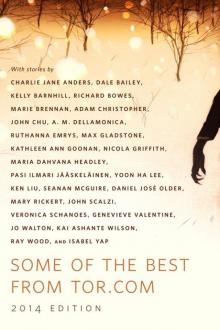 Some of the Best from Tor.com: 2014: A Tor.Com Original
Some of the Best from Tor.com: 2014: A Tor.Com Original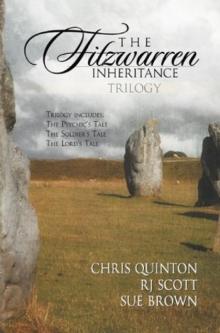 The Fitzwarren Inheritance
The Fitzwarren Inheritance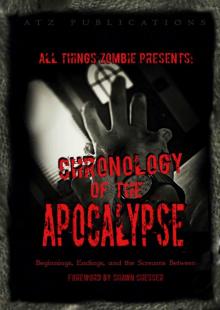 All Things Zombie: Chronology of the Apocalypse
All Things Zombie: Chronology of the Apocalypse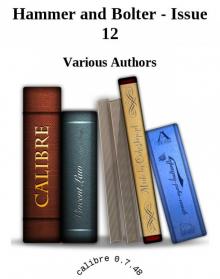 Hammer and Bolter - Issue 12
Hammer and Bolter - Issue 12 Kiss Kiss
Kiss Kiss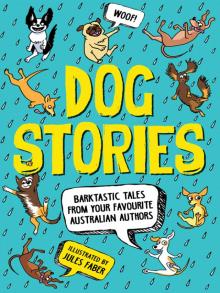 Dog Stories
Dog Stories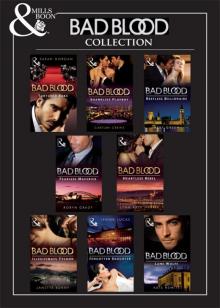 Bad Blood Collection
Bad Blood Collection